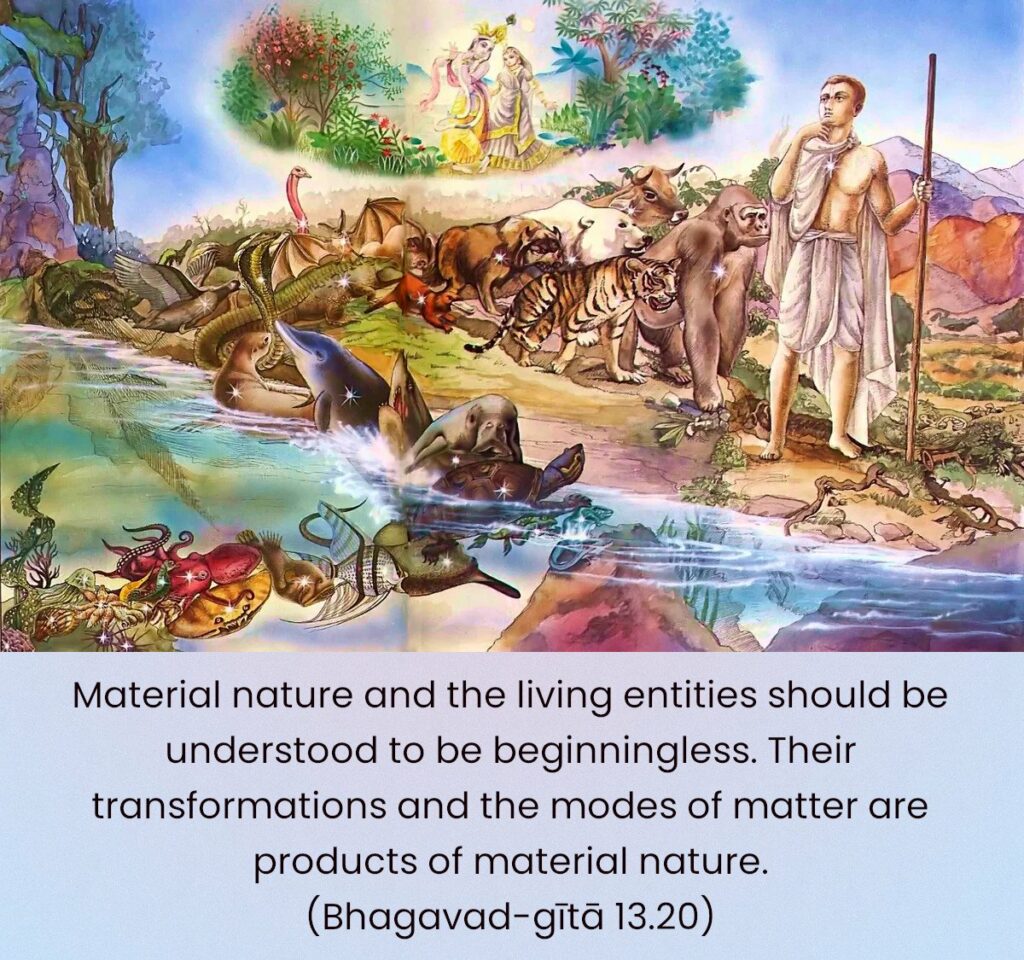प्रकृतिं पुरुषं चैव विद्ध्यनादी उभावपि |
विकारांश्च गुणांश्चैव विद्धि प्रकृतिसम्भवान् || 20||
prakṛitiṁ puruṣhaṁ chaiva viddhy anādī ubhāv api
vikārānśh cha guṇānśh chaiva viddhi prakṛiti-sambhavān
prakṛitim—material nature; puruṣham—the individual souls; cha—and; eva—indeed; viddhi—know; anādī—beginningless; ubhau—both; api—and; vikārān—transformations (of the body); cha—also; guṇān—the three modes of nature; cha—and; eva—indeed; viddhi—know; prakṛiti—material energy; sambhavān—produced by
Translation:
Know that Prakriti and Purusha are both without beginning; and know, too, that all forms and gunas are born of Prakriti.
Commentary:
Many ask the question “When did this samsara, bondage, maya, begin ?” – It would be difficult for the sleeper to say when a dream has started during sleep. This world also is of the same nature. It is beginningless. If one enters a mountain-cave full of darkness, he cannot say how long the darkness has been there. Therefore it is said that this Maya, Prakriti, is beginningless (anadi). No one can say when it began. But it has not been said that it is endless(anantam). If it is endless also, no one can cross over. Maya has no beginning, but it has an end. The moment knowledge dawns on man, it ends. The illusion is shattered, the moment Truth is seen. The dream-world may be beginningless, but the moment one wakes up it is all gone. True Knowledge then removes delusion forever. So Prakriti has no beginning but has an end; Purusha is beginningless and endless. He is eternal.
Prakriti sambhavan: Purusha is ever pure (Nityasuddha). There cannot be any change or modification in Him. Desire, hatred, pleasure and pain all these arise from Prakriti. As long as these passions agitate the mind, it is clear to everyone that he is subject to the power of Maya, that he is still in the realm of kshetra and has not attained the kshetrajna. These ‘vasanas,’ having come to man from endless births, should be cleared by determined effort, and he should reach the Purusha in due course. Whenever the mind is agitated by these passions, whenever the intellect becomes clouded, one should firmly assert and affirm that he is the Purusha, changeless, pure and perfect. He should keep himself alert and apart, and watch these modifications as objective changes in the outside world with which he is not at all concerned. He should remain firm and immovable like the mountain. That is the way to overcome the past ‘samskaras’; there is no other way.
Bhagavad Gita: Chapter 13 🔻 (35 Verses)
